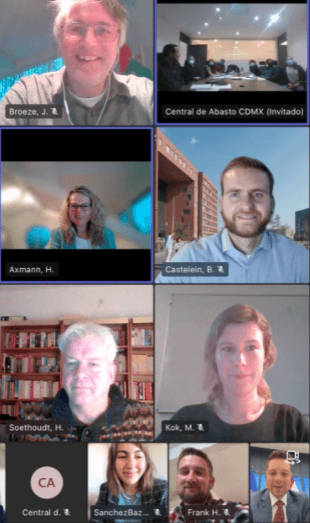A collaboration between Latin America’s largest fresh produce wholesale market and Wageningen University & Research on reducing food waste was officially launched in a virtual kick-off meeting on Monday January 31.
Moving towards zero waste
The Central de Abasto de la Ciudad de Mexico (CEDA), Latin America's largest fresh produce wholesale market, currently produces around 294 tons of food waste per day. In order to reduce this amount of waste and eventually move towards zero waste, it has set itself ambitious goals to implement circular economy principles.
Beeld: LAN Mexico
It has already embarked on promising initiatives including anaerobic digestion, biodiesel production from used cooking oil that is used as fuel for local public transport, and food donations to community kitchens in Mexico City. There is nevertheless much more needed to reduce and prevent food loss and waste.
Collaboration
As an authority on food loss and food waste prevention, research institute Wageningen Food & Biobased Research (WUR-FBR) has played a leading role in putting this subject on the political and public agenda in The Netherlands and Europe. Through the collaboration between CEDA and WUR-FBR, WUR-FBR will now be active on this subject in Mexico as well.
Over the next 14 months, the CEDA and WUR-FBR will work together in a project to generate new knowledge, tools and methods to reduce and/or give new use to food waste generated at the market. A research team of WUR-FBR will work closely together with an enthusiastic team of CEDA staff.
The project is financed by the Dutch Ministry of Agriculture, Nature and Food Quality and supported by the Netherlands Embassy in Mexico. For the Dutch Government, reducing food loss & waste is a high priority and part of its vision of circular agriculture.
Project plan, duration and deliverables
Through this project the CEDA aims for a targeted and data-driven Food Loss and Waste approach. Since detailed primary data on Food Loss and Waste is insufficiently available at the moment, the project will collect data on Food Loss and Waste at CEDA itself but also in selected supply chains from farmers to the market.
Beeld: LAN Mexico
To have an impact on Food Loss and Waste reduction the project will deploy an integrated approach by taking the whole supply chain into account. In 2021 WUR-FBR developed a methodology to identify reduction and valorization options in food supply chains. This assessment tool will now be tailored and piloted according to the specific request and needs of the CEDA.
At the end of the project the CEDA will be equipped with a methodologic toolkit for upscaling as well as a tailored Agro Chain Greenhouse Gas Emissions calculator for selected food products and supply chains. A summary of the main findings of the research will also be made available publicly.
Apart from the above-mentioned stakeholders, The FAO Mexico office will also be involved in the project. Food Loss and Waste reduction is an important priority of FAO Mexico and its involvement in the project will ensure that the latest insights and best practices in the area of Food Loss & Waste reduction are taken on board, and that project findings may be further disseminated in other countries.
This new Mexican-Dutch collaboration on reducing food waste was officially launched in a virtual kick-off meeting on Monday January 31 and has a planned duration of about 14 months.

Beeld: LAN Mexico